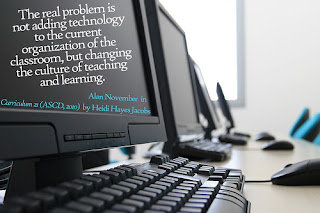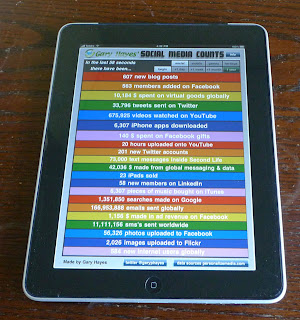by Michael Wesch
Michael Wesch and the students of Introduction to Cultural Anthropology at Kansas State University share information about college students today that was collected through a survey. I honestly feel that they have captured my personal college experience from the 26.5 hour days to the students not taking their classes seriously. I went to a smaller university before transferring to the University of South Alabama. There I did not encounter really anything on this video because the large classrooms consisted of 25-30 students and no one ever brought a laptop to class. My classes now, however are sometimes much larger and most of them are hybrid.
Next they point out that when we graduate we will be $20,000 in debt, if we are one of the lucky ones, but what are we really paying for? The video showed a girl holding a sign about her neighbor who paid for the class, but never goes. I will admit, when I was younger I did this. I really regret it now. I feel like I paid to miss out on an opportunity that many other people will never have, so now I go to every class. I also would like to point out that I chose this image because this has happened to me at least once every semester that I have been in school. Why are we required to buy these books if we are never going to need them? Is the commission on them really worth the waste?
Some teachers are now using E-books, but I find that they are not much better. The purposes of books are to use them. To use them we must write notes on them and highlight them. To do this with an E-book, you would have to print them which really defeat the purpose.
The video stated that some have suggested that technology alone can save us, yet in class I often see students on computers or cell phones checking up on Facebook, Twitter, emails, and many other things on the internet. This means that no one is paying attention to the teacher. So why are we even bothering to sit in the classrooms for three or more hours a day? Sometimes I find that I am more aggravated going to class, than just learning it on my own.
The end of this video really shook me when it was asking how taking these tests and going to these classes will help us with world problems. We did not create these problems, yet we are the ones who will deal with them. I seriously wonder how the classes I have taken have prepared me for this. I have taken over 100 credit hours and I do not recall any of my teachers talking about current events or encouraging us to even follow the local news. How will this work out?
As for what I would add to this video, I would add a few more hours to the day. There are things not recorded as time that students really have such as being a parent, being part of a social group, or even time spent exercising or athletics. Students don't always just go to class, study, eat, sleep, and work. The comment in the video, however, is still correct. I am a multitask-er. I have to be.
by Kelly Hines
This post completely stated how I feel about technology in the classroom. Ms. Hines explained the four things that have to happen for technology to succeed in the classroom, the first being that teachers must be learners.
Being a learner does not mean attending required meetings and reading required materials. To be a good learner we must go beyond what is required and stay up to date on new trends and new ways of teaching. She emphasizes on teachers being self-motivated in their pursuit of evolving understanding.
This brings me to her second point that learning and teaching is not the same thing. She mentions that she often hears teachers complain that they have taught this hundreds of times and they don’t understand why students are not getting the material. I have heard this many times myself. When someone says this what is your first thought? Was it the students or was it the teacher? Either way, this needs to be resolved.
My favorite part of this post was Ms. Hines’ comment:
I equate teaching and learning to a basic physics principle. If an object does not move, no matter how much force has been applied, no work has been done. Therefore, if a student has not learned, not matter how much effort has been exerted, no teaching has been done.
She is right that not all students are going to learn the same way; therefore we must do whatever it takes to help them understand.
The third thing she recognizes is that technology is useless without good teaching. I agree that without teachers having the correct comprehensive and curriculum development, we are simply using the basics of technology. Why would we spend thousands of dollars to only teach students word processing and games?
This is why she suggests that we should be a 21st century teacher without the technology. If we can teach the students successfully without the use of technology, then when we apply that knowledge to technology it will be amazing to see what we can accomplish. Ms. Hines’ proposes that we teach students critical thinking and problem solving skills which will help them more throughout their lives. Once we have accomplished this, then we can introduce technologies to support what the students have learned.
I find this method of teaching to be extremely fascinating. I believe that students should learn how to do things without technology that way they will actually understand what they are learning. For example, you wouldn’t give a first grader a calculator to learn 5+5=10. Why? Because if you did, they would not get the concept that a set of 5 increased by another set of 5 would give them a total set of 10. Why would we do this for any other subject matter as well?
Is It Ok to be a Technologically Illiterate Teacher?
by Karl Fisch
Although Mr. Fisch put a disclaimer for his post as well as the post he published by someone else, I couldn’t help but be a little offended. However, I also feel like my eyes have been opened to the other side of the technological controversy in education.
As we all know from the last blog response I had, how I feel about technology in education. I am not saying that I am proud to be technologically illiterate, but I am not saying I am not proud of this. In this blog post, Mr. Fisch explains how he feels about teachers who are technologically illiterate. What that made me think about is what does it take to be “technologically literate”? Who decides when someone has learned enough about technology?
I will admit that before this class I was head strong about not wanting to learn about technology. I was ashamed that I don’t know much about it, and even more embarrassed to ask someone for help. Because of this, I was not looking forward to having technology forced on me in this EDM310 class.
Nevertheless, it was a required class that I had to take. I am now very thankful for this course and for Dr. Strange and his staff. They have taught me that I can learn many things that technology have to offer on my own and that I should not be embarrassed to ask questions.
I think what I liked the best about Mr. Fisch’s post was that his main concern is for future students. He is encouraging teachers to learn more about technology so that they can teach the next generation. My favorite part of his brutally honest blog was:
You need to demonstrate continual learning, lifelong learning – for your students, or you will continue to teach your students how to be successful in an age that no longer exists.
I completely agree with this statement. As teachers we should not feel ashamed or embarrassed if there is something we do not know, especially since there are technological tools to help us learn. I know that Mr. Fisch does not want people to still think of technology as a tool, but in reality it is something that we can use to learn what we do not know. This is the same if technology is what we do not know.
Mr. Fisch left us with a question:
If a teacher today is not technologically literate - and is unwilling to make the effort to learn more - it's equivalent to a teacher 30 years ago who didn't know how to read and write.
So I guess what I have learned by reading this post is that I should continue to learn about technology and get past my fear of the unknown. This is the way the world is heading and I cannot fall behind even if it’s only for my students’ future educations.
The Changing Social Media Count
by Gary Hayes
The numbers on this site were changing so rapidly I could almost hardly believe it! For about 30 seconds I just watched in amazement. How could there be this many people online right now? How do they all know how to do this? Who taught them and what made them want to learn?
This post really made me think about how big the world really is, yet how small the internet makes it seem. There is so much going on at one time through technology, that it is overwhelming and a bit intimidating. As a teacher I need to inform myself of these different forms of technology. My students will most likely all ready have knowledge of some of these networks. If there are that many people out there who are doing all of this right now, than why can’t I be one of them? I am going to use these rising numbers as encouragement to join the world and learn what I can through technology!




Jessica,
ReplyDeleteI agree that most students' experience in college is very much like the video. It is a shame that we spend so much money on classes and books. I absolutely hate taking classes in which the teacher only lectures, and I also hate online classes. We have to pay more for those classes, and we hardly interact with the teacher or classmates. I have also bought numerous textbooks that I never use. I noticed that you said ebooks are not better than print books. While I personally do not like ebooks because I don't like reading off a screen, you can still highlight and bookmark the pages. There are disadvantages to technology when the students do not use it appropriately, but as you are learning in EDM, technology can improve the classroom so much.
Jamie Lynn,
ReplyDeleteYou do have a good point about using technology appropriately in the classroom. Hopefully I can learn more ways to use it to better teach my future students. Thank you for your help!
"The end of this video really shook me when it was asking how taking these tests and going to these classes will help us with world problems." I think in lower level classes I sometimes feel like I'm not learning applicable skills or knowledge, however, in the college of education I usually feel like I am gaining useful skills. Maybe we won't be able to solve all the world's problems but I think, as educators, we can hope to help our students deal with them.
ReplyDeleteI loved the physics quote from Ms. Hines too. I really like how you used the HTML to make it a block quote. I might have to steal that!